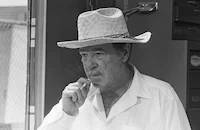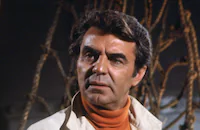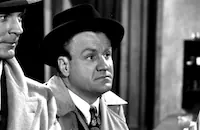I Was a Communist for the F.B.I.

Brief Synopsis
Cast & Crew
Gordon Douglas
Frank Lovejoy
Dorothy Hart
Philip Carey
James Millican
Richard Webb
Film Details
Technical Specs

Synopsis
Agents of the Federal Bureau of Investigation alert the local FBI chief, Ken Crowley, that a top Communist agent, Gerhardt Eisler, is coming to Pittsburgh. Meanwhile, Matt Cvetic, a second-generation Slovenian American, is at a family gathering where everyone except his mother is uncomfortable around him, including his sixteen-year-old son Dick. When Matt must leave in response to a call he receives ordering him to Eisler's hotel suite, his brother Joe accuses him of being a "Red." After he reports by pay phone to Crowley's assistant Mason, Matt arrives at Eisler's luxury hotel room, where an expensive spread, with caviar and champagne, is laid out for the local Communist officials. Jim Blandon, the Pittsburgh party leader, introduces Matt to Eisler, commending Matt for bringing Slovenians into the party and using his position in the personnel office of North American Steel Company to hire party members for key positions. Eisler promotes Matt to the position of chief party organizer for the Pittsburgh district, then orders the group to create discontent in the Pittsburgh workers. The next day, Matt is called to Dick's school, where he learns that Dick has been scrapping with students over the question of Matt's party membership. When Matt privately admits to Dick that he is a member, Dick expresses his shame. That evening at his apartment, Matt writes a letter explaining why he works undercover for the FBI as a Communist party infiltrator, planning to entrust it to the priest, Father Novac, with instructions to give it to Dick should he die. Although weary of the burden of his double life, Matt cannot clear his name without jeopardizing the FBI's work. He hides his displeasure when Eve Merrick, who introduced herself to him that afternoon at the school, shows up to confide that she, too, is a party member. Later, at the Communist headquarters, Blandon tells Matt that Eisler wants them to engineer a strike at the steel mill. As the room has been wired with a hidden microphone by the FBI, Crowley is able to warn Matt later that Eve has orders to shadow him. Matt's mother dies, and after the funeral, Novac returns Matt's letter, as he is being transferred to Rome. Matt, who is accompanied by Eve, puts the letter in his coat, but it falls to the ground when Joe, angered by the presence of Matt's "comrades," slugs him. When Matt later discovers the letter missing, he fears that Eve has it, until he hears a secret FBI recording of her report to Blandon, during which she does not mention it. At the strike, Blandon has thugs physically assault opposing union members, and Eve is disgusted by the violence. Matt realizes that they are being watched by Blandon's informers, so he reprimands her for her disloyalty. Then, after Crowley and Mason promise protection for Eve, Matt reports the incident to Blandon. To keep his cover intact, Matt later confronts Eve about her loyalty in front of the other officials, and she admits her disillusionment and quits. Matt guesses that Blandon has ordered her death and convinces her to leave town. Eve returns his letter, saying how it helped her to repudiate Communism. After Eve leaves with Matt for the train station, Blandon's thugs break into her apartment and stab a mysterious man who is trying to arrest them. Meanwhile, seeing two men follow Eve, Matt boards her train and stops them from killing her. After a fight in which both of the would-be assassins are killed, Eve is sent safely out of town and Matt resumes his cover, as no one alive can incriminate him. However, after the newspapers report the deaths of the two men, Matt is interrogated and beaten by Blandon and Clyde Garson, a visiting Communist leader. Policemen show up fortuitously to arrest Matt for the murder of Jim Broderick, an FBI agent found dead in Eve's apartment. After Matt is taken away, Mason and Crowley, who were behind his rescue, order him to testify against eleven New York Communists and suggest that, until the trial, he is safer behind bars. Later, the district attorney decides that Matt's testimony is unnecessary to convict the defendants, and Blandon springs Matt from jail, after having second thoughts about his suspicions. All of the Pittsburgh Communist leaders are subpoenaed to appear before the House Un-American Activities Committee. On the day of Matt's appearance, Crowley brings Joe and Dick to hear Matt's testimony, in which Matt states that he has been an undercover FBI agent for nine years. Afterward, Matt is free to resume a normal life with his proud family.

Director

Gordon Douglas
Cast

Frank Lovejoy

Dorothy Hart

Philip Carey

James Millican
Richard Webb
Konstantin Shayne

Paul Picerni

Roy Roberts

Eddie Norris
Ron Hagerthy
Hugh Sanders
Hope Kramer
Frank Gerstle

Russ Conway
Kasia Orzazekski
Ann Morrison
Paul Mcguire
Douglas Evans
Janet Barrett
Karen Hale

Joseph Smith
Jim O'gatty
Frank Marlowe
Mike Ross
Lenita Lane
Alma Mansfield
Ann Kimball
Paula Sowl
Grace Lenard
Eric Neilsen
Roy Engle
Bill Lester
John Crawford
Ernest Anderson
Sugarfoot Anderson
Johnny Bradford
Jimmy Gonzalez
David Macmahon
Charles Horvath
Phil Tully

Barry Sullivan
Howard Negley
Bobby Gilbert
James Adamson
Barry Reagan

Lyle Latell
Chuck Coleman
Dick Gordon
William Bailey
Paul Bradley
Robert "buddy" Shaw
William Forrest
Bert Moorhouse
Theresa Harris
Charles Sherlock
Mary Alan Hokanson
Mildred Boyd
George Macgrill
Gorilla Jones
Snub Pollard
Crew
Al Alleborn
Jean Baker
Gordon Bau
Folmar Blangsted
William Classen
Edwin Dupar
Ray Foreman
Bryan Foy
C. S. Friend
Morris Goldman
Bud Graybill
Oren Haglund
Leslie G. Hewitt
Lou Jennings
Victor Johnson
Leo K. Kuter
William Lava
Otis Malcolm
Wally Meinardus
Lyle B. Reifsnider
Claude Swanner
Victor Vallejo
Crane Wilbur
Mina Willowbird

Videos
Movie Clip



Film Details
Technical Specs

Award Nominations
Best Documentary Feature
Articles
I Was a Communist for the F.B.I.
Synopsis: Pittsburgh steelworker Matt Cvetic (Frank Lovejoy) has spent the past nine years working undercover for the Federal Bureau of Investigation. He poses as a member of the Communist Party, and has risen up in the ranks of the local command structure. He has confided the truth only to his priest (Roy Roberts), and his affiliation has caused great strain within his large Slovenian family; his brothers detest him, his son (Ron Hagerthy) gets beat up at school trying to defend his name, and his elderly mother (Kasia Orzazewski) loves him but is confused by his actions. The F.B.I. trails top Communist Gerhardt Eisler (Konstantin Shayne) to Pittsburgh, where he meets with local Party bosses Jim Blandon (James Millican) and Harmon (Eddie Norris). Cvetic is present as the Commies eat caviar and plan to weaken the heart of America's industrial might by placing more Communists in the steel industry and by causing race riots and violent labor strikes in the city. Matt is visited by his son's teacher Eve Merrick (Dorothy Hart), who reveals that she too is a Communist Party member, sent by the higher-ups to spy on Cvetic. Eve is quickly becoming disillusioned with the Party's methods, but Cvetic must keep his cover in an effort to get enough information to the F.B.I. for their federal probe of the Red Menace.
Produced by Bryan Foy for the Warner Bros. B-unit, I Was a Communist for the F.B.I. appears to have existed mainly to glorify efforts to root out the Communist Threat wherever it may (or may not have) existed, and to placate the House Committee on Un-American Activities (HUAC), which in 1947 had investigated Hollywood involvement by Communists and Communist sympathizers. The screenplay (by veteran crime and prison-movie scribe Crane Wilbur) would have you believe that, at that moment in time, Communists were infiltrating the public schools as teachers, that they instigated race riots, and that they were systematically attempting to take over the industrial sector of the United States from the inside, one worker at a time. (Party members working at Cvetic's steel factory sabotage the production line to injure non-members so that Communists can move up in the rank-and-file). Most alarmingly, Wilbur depicts teachers, union members, and civil rights workers as Red Dupes, unwittingly helping the Communist cause with only minor prodding from the Party machine; clearly, reformers, free-thinkers, and intellectuals were not to be trusted with America's freedoms in the world that I Was a Communist for the F.B.I. presents. Wilbur's screenplay also presents an odd view of the Communists working in the U.S. As depicted in the film, they are simultaneously high-living elitists as well as common thugs, able to enjoy champagne and caviar with Soviet leaders in one moment, but handy with a lead pipe (wrapped provocatively with a Jewish newspaper) in the next.
Square-jawed Frank Lovejoy brings his usual no-nonsense approach to the lead role as undercover man; he would go on to portray a variety of cops, detectives and military men during his career. As played by Lovejoy, Matt Cvetic is determined to do what it takes to remain undercover and expose the Commie threat, but it is clearly painful to subject himself to the disdain of the community and, in particular, his family. Lovejoy is convincing as a hardliner in this conflicted situation and his performance manages to elicit sympathy, no matter what the politics involved.
Writing in the New York Times, Bosley Crowther pegs I Was a Communist for the F.B.I. as "a hissing and horrendous spy film" and points out the recklessness of the filmmakers, saying "[the movie] tosses off dangerous innuendos and creates some ugly bugaboos in the process of sifting the details of how the Communists bore from within. For instance, in glibly detailing how the Communists foment racial hate and labor unrest in this country, it colors its scenes so luridly that the susceptible in the audience might catch a hint that most Negroes and most laborers are 'pinks.' It raises suspicion of school teachers by introducing one as a diligent 'party member' at the outset, [and] ...it drops suggestions always from the villains' oily tongues that people who embrace liberal causes... are Communist dupes."
The writer for Variety sidesteps the politics of the film and justly notes that the "direction of Gordon Douglas plays up suspense and pace strongly." The critic for Time magazine writes that "I Was a Communist for the F.B.I. falls into a crude pattern, both as melodrama and propaganda. Its exposition of the Communist conspiracy... is as oversimplified, mechanical, and unconvincing as the anti-capitalist preachments of left-wing Broadway plays in the '30s. For the benefit of the audience, the movie's Communists are forever reciting to each other, as if for the first time, the ABC's of party tactics." Further, this astute critic notes that the film presents a simplistic view of Communists "...as simple gangsters, cynically out for a fast buck and the ultimate spoils of power. Real-life Communists are not so simple... their cynical opportunism is rooted in a warped but zealous idealism, which makes them more formidable foes and better material for dramatic treatment."
In Film Noir: An Encyclopedic Reference to the American Style, Robert Porfirio writes that I Was a Communist for the F.B.I. "...demonstrates how easily the conventions of noir thrillers could be used for these propaganda pieces, which were produced by the motion picture studios for more political reasons than for commercial value. Of all of them, including The Red Menace, Iron Curtain, I Married a Communist, and The Whip Hand, I Was a Communist for the F.B.I. is the most visually noir."
Director Gordon Douglas would use a similar docu-noir style a few years later for the very influential Warner Bros. science fiction movie Them! (1954), probably his best-regarded film today. Following the fall from public favor that McCarthyism experienced in the mid-1950s, I Was a Communist for the F.B.I. was largely forgotten, although its sensationalistic title was appropriated, in tongue-in-cheek manner, for two monster thrillers by American International Pictures, I Was a Teenage Werewolf and I Was a Teenage Frankenstein (both 1957).
Producer: Bryan Foy
Director: Gordon Douglas
Screenplay: Crane Wilbur
Cinematography: Edwin DuPar
Art Direction: Leo K. Kuter
Music: Max Steiner (uncredited)
Film Editing: Folmar Blangsted
Cast: Frank Lovejoy (Matt Cvetic), Dorothy Hart (Eve Merrick), Philip Carey (Mason), James Millican (Jim Blandon), Richard Webb (Ken Crowley - FBI chief), Konstantin Shayne (Gerhardt Eisler), Paul Picerni (Joe Cvetic), Eddie Norris (Harmon), Ron Hagerthy (Dick Cvetic), Hugh Sanders (Clyde Garson), Hope Kramer (Ruth Cvetic)
BW-83m.
by John M. Miller

I Was a Communist for the F.B.I.
Quotes
Trivia
Notes
The opening title cards reads: "I Was a Communist for the F.B.I. Based on the experiences of Matt Cvetic as told to Pete Martin and published in The Saturday Evening Post." Voice-over narration, spoken by Frank Lovejoy as Cvetic, is heard at the beginning of the film. January and February 1951 Hollywood Reporter news items add Don Blackman, Russ Conway and Harlan Warde to the cast. Their appearance in the final film has not been confirmed. According to a February 1951 Hollywood Reporter news item, 2,000 extras were hired for the strike sequences.
Warner Bros. production notes state that some scenes were shot on location at Burbank High School in Burbank, CA, and that the Bunker Hill area of downtown Los Angeles was to be used for exterior neighborhood shots, but was not because the houses were torn down to build the Hollywood Freeway. The set for the final courtroom scene was designed using authentic photographs and drawings of the room in the House of Representatives building where the House Committee on Un-American Activities (HUAC) held its hearings. A special trailer for the film, featuring James Millican, was made to target college students, according to a January 1951 Hollywood Reporter news item. The film, one of the first to deal with HUAC, epitomized Hollywood's response to the threat of Communism, and the title and style of the film was often parodied in later film and television productions. The picture received an Academy Award nomination in the Documentary (Feature) category.














